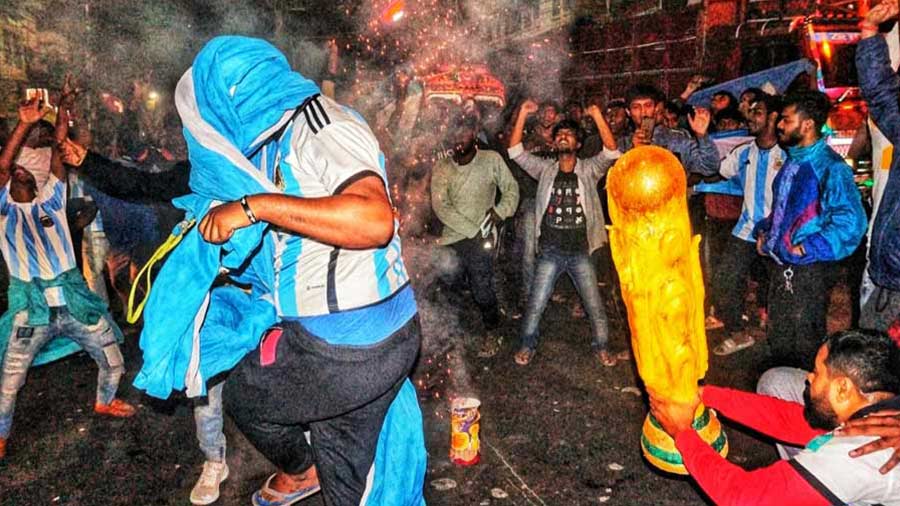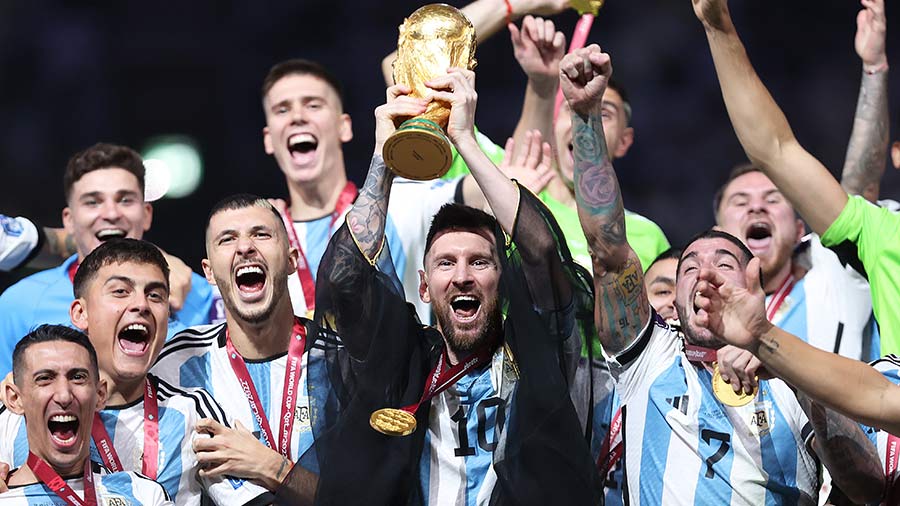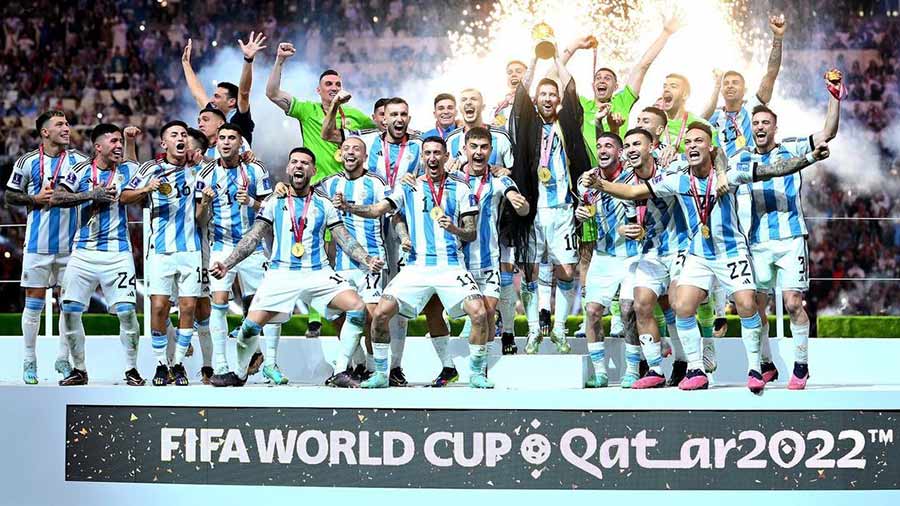Seeing may be believing, but hearing is feeling. Out of all the human senses, our sense of hearing is the purest, the most natural. Unadorned by filters or cosmetics, unaffected by artificial aromas, untouched by layer upon layer of commerce and culture, and unmoved by all manner of seasoning, our auditory sense, even today, remains largely raw and authentic. What we hear and how we hear it is thus visceral. From a familiar voice to a favourite tune, from the whirr of the fan to the hum of a bee, sounds evoke all kinds of ideas, emotions and stories, from the mundane to the magical. And yet, they play second fiddle, a sidelined sense that is often overtaken by images.
As a case in point, think of the recently concluded FIFA World Cup in Qatar, arguably the most exciting edition of the tournament in a generation. Now that the football has been played and the narratives have been fulfilled, what remains etched in public consciousness? Invariably, the images. That of Lionel Messi lifting the one trophy that had eluded him for almost two decades, that of Kylian Mbappe exploding the final into life, that of Moroccan players enjoying each of their victories with their mothers, that of Cristiano Ronaldo walking down the tunnel in tears. And many, many more. But what about the sounds? While not as instantly memorable, they, too, played their part in the World Cup, conjuring an immersive experience of a lifetime.
Standing out through sounds

Argentina’s supporters sing ‘Muchachos’, which became the World Cup’s most iconic song this year Courtesy FIFA
Increasingly, all FIFA World Cups look the same. Take any three freeze-frames of action on the pitch from the past three World Cups and notice how they are almost indistinguishable. From the cut and the colour of the grass to the lighting of the pitch-side advertising boards, from the TV camera angles to the uniform formats of the jerseys. For those watching at home, Brazil, Russia and Qatar may well have been the same corner of FIFA-land. Earlier, each World Cup would create a unique tapestry of visual aesthetics — the vibrancy of Mexico in 1986, the optical immensity of the US in 1994, the carnival vibes of Japan and South Korea in 2002, to name a few. But FIFA’s insistence on homogenising their most coveted product has taken away the natural dynamism of host countries as seen on TV. However, at least for now, what we hear on TV still feels different.
While Qatar 2022 did not feature the endless trumpeting of vuvuzelas heard in South Africa in 2010, this year’s showpiece event once again offered a distinct soundtrack. For those watching at the stadiums, there was an unceasing barrage of loud music, which, fortunately, did not trickle into the TV footage. Instead,what most TV audiences heard as the first memorable sound during games were the national anthems. Thanks to cutting-edge technology, these powerful hymns have never been heard more clearly, in spite of sitting thousands of miles away. Everytime Argentina’s players belted out the words of Hear Mortals, the Sacred Cry, one could resonate with the sheer intensity each syllable exuded. Speaking of songs, Muchachos (a tribute to the legend of Diego Maradona and the promise of Messi) became the unofficial theme song of the World Cup, performed relentlessly by Argentine fans, for whom the lyrics are as much about rejoicing as they are about redemption. Like the Icelandic contingent at Euro 2016, Argentina’s fans were the life force of the World Cup this time around, with several thousands of them not even from Argentina. Their chants (most simply and famously, “Messi, Messi, Messi”), their shouts and squeals, and above all, their songs were unmissable, giving this World Cup’s soundtrack an edge that both Brazil 2014 and Russia 2018 lacked.
Apart from the sounds that bellowed from the stands, there were the sounds that emerged from the pitch. The chime of the ball nestling into the net when Richarlison rounded off the move of the tournament for Brazil against the Korea Republic. The thud of a crunching tackle, where studs met flesh, on Kylian Mbappe in the semi-final with its peculiar echoes of discomfort. The roar of Japanese joy when the underdogs from Asia upstaged Germany and then Spain en route to a sensational run to the knockout rounds. The gasp of awe from the players (and from the self) whenever Neymar left a defender for dead or Luka Modric tiptoed his way past his marker. The blare of goalkeepers managing their defences, of coaches instructing their wingers, of captains urging their teammates to push harder. And, of course, the blast of the referee’s whistle, deciding relief or regret, depending on one’s loyalties.
Making sense of all this was the commentary, which, in Qatar’s case, had one outstanding voice — the Homer of football, also known as Peter Drury. Grand without being sentimental, imaginative without being ornate, and relatable without being reductive, Drury was in top form at the World Cup. Especially when it came to describing Argentina and Messi, which he did for all but one of the eventual world champions’ games (their opening defeat to Saudi Arabia). In a sport where the action has to be identified, contextualised and dramatised, often in the same sentence, Drury delivered the goods and some more. Arguably his most iconic lines came moments before the final kicked off, summoning the goosebumps: “Lionel Messi stares up at his final peak. Kylian Mbappe prowls in the foothills of greatness. From the Andes to the Alps, from River Plate to the banks of the Seine, our planet unites around its ultimate game.”
From Kolkata with noise
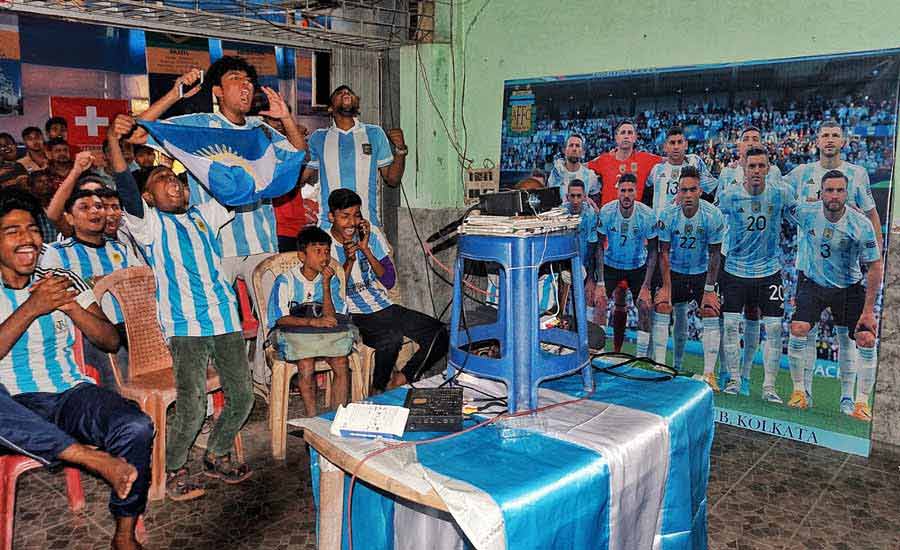
Football lovers in Kolkata cheering on Argentina TT Archives
While Qatar brought its potpourri of sounds to the screen, it was not enough to escape the noise of one’s immediate surroundings. And just as well, for that, too, had its own contributions to this World Cup. As someone who watched World Cup matches with the phone on vibration (a habit born out of a superstition), the constant pinging of messages brought its own auditory appeal for me. Whenever Argentina, Brazil or France would score a goal, there would be a flood of pings. When Brazil were knocked out by Croatia, I felt as if my phone, and then my ears, would explode. Somehow there was serene silence after Messi had danced his way past Josko Gvardiol in the semi-final. Apparently, no words, emojis or stickers were sufficient to capture a genius in full flow. But come the final, my WhatsApp was in “beast mode”, since my fellow football lovers could not stop providing their live commentary on text, as a topsy-turvy match made us all go through the entire wringer of emotions.
In a city like Kolkata, where practically every other household is glued to the World Cup, one can afford to not watch a match and still reasonably predict its result. The answer is always blowing in the noise. The auditory markers in my locality of Manikatala in north Kolkata revolved around fireworks. If a superstar scored a goal, there would be a two-minute equivalent of peak Diwali. If the favourites won, then the baaji phatano would last even longer. If neither happened, then the choicest abuses (from nextdoor neighbours), sometimes an amusing reflection of the average Kolkatan’s trilingualism, would make themselves audible. Occasionally, someone would play Waka Waka or Wavin’ Flag on loudspeaker (nobody seems to have heard 2022’s official World Cup song), making most of us shake a leg or two. And to top it all off, there would be howls of “Goaaaaallllll”, as if select people in my para were moonlighting as a commentator for South American listeners.
What remained unheard
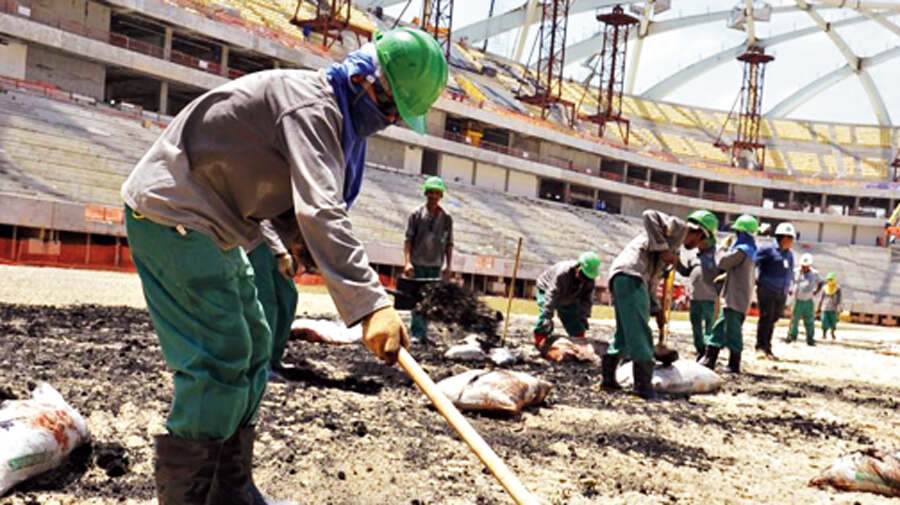
About 500 people might have died as a result of poor working conditions during the construction of the World Cup stadiums in Qatar
Looking, or rather, hearing back, the din from and about events in Qatar over the last month or so was fabulous. A testament to the synergy football produces through its complex and compelling symphony. But it was not complete. Largely because there were sounds that were never heard in Qatar, at least not by the average TV watcher of the World Cup. The wail of the families who lost their men to remorseless working conditions at the very stadiums that were graced by the game’s greatest. The sighs, even sobs, of the LGBTQI+ community, many of whom did not feel safe enough to travel to Qatar, where to be a homosexual is still to be a criminal. The shrieks of thousands trapped in an endless war in Syria, where Qatari money is partly responsible for one of the biggest humanitarian crises of modern times, the same money that is alleged to have bought over FIFA en route to making the World Cup in West Asia a reality.
All this is not to diminish or nullify a spectacular World Cup. It is to merely remind that not even the most entertaining or edifying of sporting rumbles exists in a bubble. That in the midst of everything that makes us scream, hoot and laugh in relation to the limitless potential of one round piece of leather, there are other ideas, emotions and stories that lie suppressed. Untapped, untold, unheard. The sounds in search of a voice.

